Confucius(孔子)
为什么孔子的英文名叫Confucius
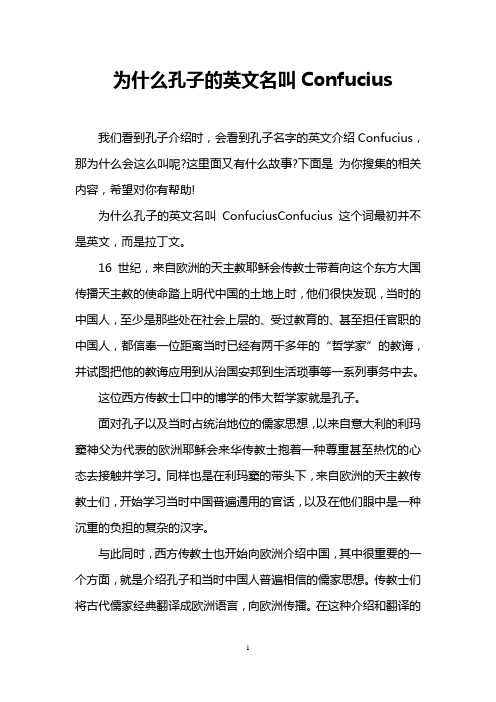
为什么孔子的英文名叫Confucius我们看到孔子介绍时,会看到孔子名字的英文介绍Confucius,那为什么会这么叫呢?这里面又有什么故事?下面是为你搜集的相关内容,希望对你有帮助!为什么孔子的英文名叫ConfuciusConfucius 这个词最初并不是英文,而是拉丁文。
16 世纪,来自欧洲的天主教耶稣会传教士带着向这个东方大国传播天主教的使命踏上明代中国的土地上时,他们很快发现,当时的中国人,至少是那些处在社会上层的、受过教育的、甚至担任官职的中国人,都信奉一位距离当时已经有两千多年的“哲学家”的教诲,并试图把他的教诲应用到从治国安邦到生活琐事等一系列事务中去。
这位西方传教士口中的博学的伟大哲学家就是孔子。
面对孔子以及当时占统治地位的儒家思想,以来自意大利的利玛窦神父为代表的欧洲耶稣会来华传教士抱着一种尊重甚至热忱的心态去接触并学习。
同样也是在利玛窦的带头下,来自欧洲的天主教传教士们,开始学习当时中国普遍通用的官话,以及在他们眼中是一种沉重的负担的复杂的汉字。
与此同时,西方传教士也开始向欧洲介绍中国,其中很重要的一个方面,就是介绍孔子和当时中国人普遍相信的儒家思想。
传教士们将古代儒家经典翻译成欧洲语言,向欧洲传播。
在这种介绍和翻译的过程中,就不免要翻译儒家创始人至圣先师孔子的名字。
罗马天主教会的官方语言一直以来都是继承自罗马帝国的拉丁语,随着时间的推移,古罗马时代使用的古典拉丁语在中世纪天主教会那里演变成了「教会拉丁语」,并一直使用到今天。
而拉丁语在当时的欧洲,特别是在欧洲学术界,也是沟通各个不同国家与文化的通用语言。
作为天主教圣职人员的利玛窦等耶稣会传教士,在翻译中国经典和中国人名、地名并向他们的欧洲同胞进行介绍的时候,使用的自然也就是教会拉丁语。
利玛窦选取了孔子比较流行的一个称呼孔夫子,将这个名字用音译的方式翻译成拉丁语。
明朝时期的汉语官话的发音与今天普通话发音的区别并不大,而孔夫子三字在明朝官话中的发音也基本上和今天的kǒngfūzǐ一样。
Confucius(孔子)
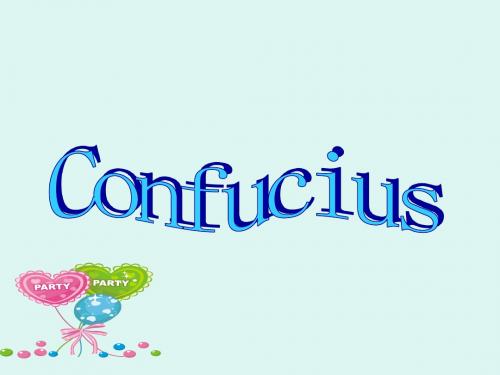
Confucius loves education career, devoting all his life to education activities. He is insatiable in learning. Not only teach by precept, but also do examples, in their own model behavior influence students. He loves his students, students also respect him very much, a harmonious relationship between teachers and students. He is a glorious and typical teacher of ancient China . Confucius' education activities not only has cultivated many students, but he put forward the practice of education theory, which lays the foundation of the ancient Chinese education
When Confucius was 3 years old, his father was die . under Yan ZhengZai’s education, He loved learning. Confucius had a difficulty youth. He aspired to learn at15. 30 years old, he was learned, become a famous scholar, and taught others, also creating a private school. His idea is “kindness", that is “to love“.
孔子Confucius
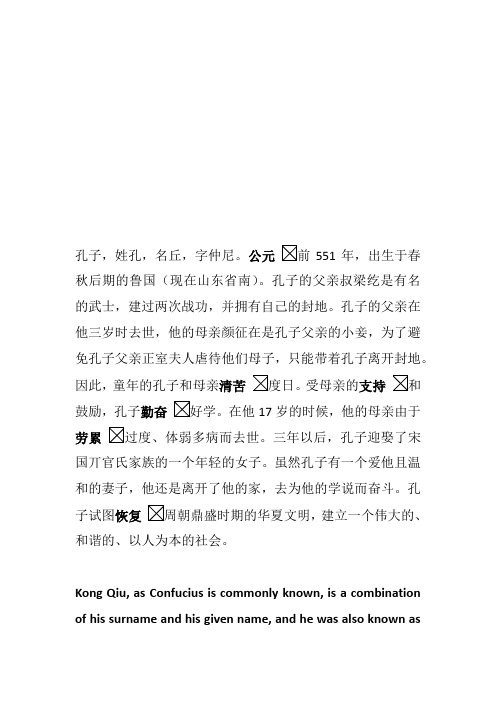
孔子,姓孔,名丘,字仲尼。
公元 公元前 551 年,出生于春秋后期的鲁国(现在山东省南) 。
孔子的父亲叔梁纥是有名 的武士,建过两次战功,并拥有自己的封地。
孔子的父亲在 他三岁时去世,他的母亲颜征在是孔子父亲的小妾,为了避 免孔子父亲正室夫人虐待他们母子,只能带着孔子离开封地。
因此,童年的孔子和母亲清苦 清苦 鼓励,孔子勤奋 勤奋 劳累 度日。
受母亲的支持 支持 和好学。
在他 17 岁的时候,他的母亲由于过度、体弱多病而去世。
三年以后,孔子迎娶了宋国丌官氏家族的一个年轻的女子。
虽然孔子有一个爱他且温 和的妻子,他还是离开了他的家,去为他的学说而奋斗。
孔 子试图恢复 恢复 周朝鼎盛时期的华夏文明, 建立一个伟大的、和谐的、以人为本的社会。
Kong Qiu, as Confucius is commonly known, is a combination of his surname and his given name, and he was also known asZhong Ni, which is his courtesy name. He was born in 551 BC in the Lu state (This state was in the southwest of modern-day Shandong Province) in the later days of the Spring and Autumn Period. Confucius was from a warrior family. His father Shulianghe was a famous warrior who had military exploits in two battles and owned a fiefdom. Confucius lost his father when he was three years old, and then his mother Yan Zhengzai took him and left the fiefdom because as a concubine, she wanted to avoid mistreatment fromShulianghe's formal wife. Thus, Confucius lived in poverty with his mother since childhood. With the support and encouragement of his mother, Confucius was very diligent in his studies. When Confucius was seventeen years old, his mother died as a result of illness and overwork. Three years later, Confucius married a young woman who was from the Qiguan family of the Song state. Though he had a mild tempered wife who loved him, he left his family to strive for his ideals. Confucius sought to revive the perfect virtue of Huaxia (Chinese civilization) and the classical properties of the Western Zhou Dynasty to build a great, harmonious and humanistic society. 孔子的哲学强调个人与统治集团的道德 道德 ,社会关系的合理性,以及公正 公正和真诚 真诚。
confucius是什么意思

confucius是什么意思
confucius可作名词,指的是儒家学派创始人“孔子”。
例句:Confuciuss many words are wisdom. 翻译:孔子的很多话都是至理名言。
扩展资料
confucius 双语例句
例句 1. The sayings of Confucius offer guidance on this matter.
孔子的.教诲为此事提供了指引。
例句 2. Confucius is considered the greatest of the ancient Chinese sages.
孔子被认为是古代中国最伟大的圣人。
例句3. We go to the Confucius Temple and enjoy various lanterns there every year on Lantern festival.
我们每年元宵节都到夫子庙逛花灯。
例句 4. Confucius, a pioneer in the field of education.
孔子,教育领域的先驱。
例句 5. As Confucius said thousands of years ago.
正如孔子几千年前所说。
例句6. Inspiration for Modern Education from Educational Method and Thinking of Confucius.
孔子的教育思想和教育方法对当代教育的启示。
孔子的简短介绍

孔子的简短介绍1.孔子简单的介绍孔子(前551-前479)英文名字:Confucius名丘,字仲尼,春秋后期鲁国人。
公元前551年9月28日(农历八月二十七日)生于鲁国邹邑昌平乡(今山东省曲阜市东南的鲁源村);公元前479年4月11日(农历二月十一日)逝世,享年72岁,葬于曲阜城北泗水之上,即今日孔林所在地。
他的祖先是宋国贵族,大约在孔子前几世就没落了。
孔子年轻时做过几任小官,但他一生大部分时间是从事教育,相传收弟子多达三千人,教出不少有知识有才能的学生。
春秋末期思想家、教育家,儒学学派的创始人,在世时已被誉为“天纵之圣”、“天之木铎”,是当时社会上最博学者之一,并且被后世尊为至圣(圣人之中的圣人)、万世师表。
因父母曾为生子而祷于尼丘山,故名丘,鲁国陬邑(今山东曲阜东南)人。
曾修《诗》、《书》,定《礼》、《乐》,序《周易》,作《春秋》。
孔子的思想及学说对后世产生了极其深远的影响。
2.孔子的简介孔子子姓,以孔为氏,名丘,字仲尼。
春秋时期鲁国陬邑昌平乡(今曲阜市南辛镇)人。
家中排行第二。
我国古代伟大文学家,思想家,政治家,教育家,社会活动家,古文献整理家,儒家学派创始人。
相传曾修《诗》《书》,订《礼》《乐》,序《周易》,作《春秋》。
他一生从事传道,授业,解惑,被中国人尊称“至圣先师,万世师表”。
后人把孔子的言行语录记录下来,作成《论语》。
在天道观上,孔子不否认天命鬼神的存在,但又对其持怀疑态度,主张“敬鬼神而远之”。
孔子与孟子并称“孔孟”,孔子被尊为“至圣”“素王”,曾子则为宗圣。
孟子为“亚圣”。
他的言行被他的学生写成创世巨作《论语》。
他还是世界最著名的文化名人。
成就孔子对后世影响深远,虽说他“述而不作”,但他在世时已被誉为“天纵之圣”、“天之木铎”、“千古圣人”,是当时社会上最博学者之一。
后世并尊称他为“至圣”(圣人之中的圣人)、“万世师表”,认为他曾修《诗》《书》,定《礼》《乐》,序《周易》(称《易经》十翼,或称易传),著《春秋》。
孔子简介

全国人大常委会原副委员长许嘉璐,文化 部副部长周和平,日本前内阁官房长官武村正 义与来自中国内地和香港、澳门、台湾地区以 及韩国、新加坡、马来西亚、美国、法国、英 国、比利时、丹麦、澳大利亚等22个国家和地 区、86个儒学研究机构的172位专家学者、各 界人士共襄盛举。这些来自不同国度、不同民 族、不同文化的专家学者、各界人士,围绕儒 学的历史研究、儒学的当代价值、儒学的现代 阐释、儒学的世界传播、儒学与和谐文化等议 题,进行了深入研讨与广泛对话。
据记载,孔子的祖先本是殷商后裔,故为子姓。周
灭商后,周武王封商纣王的庶兄,商朝忠正的名臣 微子启于宋(夏邑)。 微子启死后,其弟微仲即位, 微仲即为孔子的先祖。自孔子的六世祖孔父嘉之后, 后代子孙开始以孔为氏,其曾祖父孔防叔为了逃避 宋国内乱,从宋国逃到了鲁国。孔子的父亲叔梁纥 (叔梁为字,纥为名)是鲁国出名的勇士,叔梁纥 先娶施氏曜英,生九女而无一子,其妾生一子孟皮, 但有足疾。在当时的情况下,女子和残疾的儿子都 不宜继嗣。叔梁纥晚年与年轻女子颜征在再下孔子。 孔子的伟大思想与孔子母亲有很大关系,其母颜征 在和他的外祖父颜襄对孔子产生了深远影响,颜征 在的教学理念简直是先进了两千年。
孔子简介
孔子:子姓,以孔为氏,名丘,字仲尼。
“子”,古代对成年男子的尊称,在春秋战 国时期,拥有一定社会地位的成年男子都可 以称为“子”,而且都希望别人称自己为 “子”,因为“子”还是一种爵位,所谓 “公侯伯子男”也。但是,真正能获得别人 以“子”相称的,一般是两种人:要么在社 会上公信力较高的,如“老师”;要么就是 较有道德的贵族;孔子、老子属于前者。而 孔子是我国古代最伟大的政治家、思想家、 教育家和军事家。儒家学派创始人,世界最 著名的文学名人。与孟子并称“孔孟”,孔子
论语简介
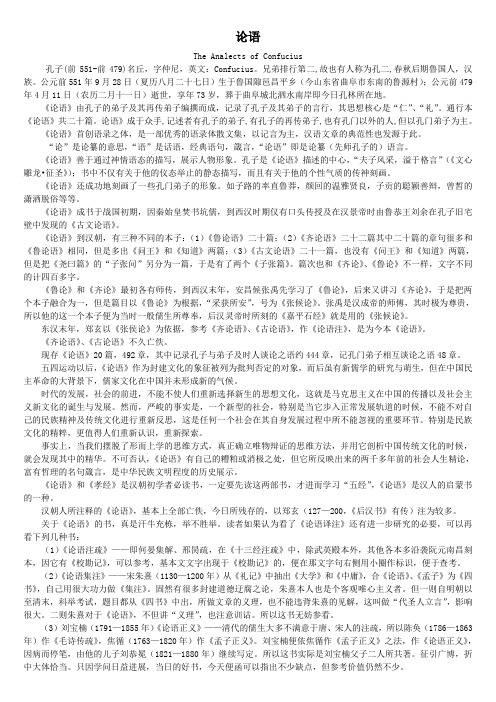
论语The Analects of Confucius孔子(前551-前479)名丘,字仲尼,英文:Confucius。
兄弟排行第二,故也有人称为孔二,春秋后期鲁国人,汉族。
公元前551年9月28日(夏历八月二十七日)生于鲁国陬邑昌平乡(今山东省曲阜市东南的鲁源村);公元前479年4月11日(农历二月十一日)逝世,享年73岁,葬于曲阜城北泗水南岸即今日孔林所在地。
《论语》由孔子的弟子及其再传弟子编撰而成,记录了孔子及其弟子的言行,其思想核心是“仁”、“礼”。
通行本《论语》共二十篇。
论语》成于众手,记述者有孔子的弟子,有孔子的再传弟子,也有孔门以外的人,但以孔门弟子为主。
《论语》首创语录之体,是一部优秀的语录体散文集,以记言为主,汉语文章的典范性也发源于此。
“论”是论纂的意思,“语”是话语,经典语句,箴言,“论语”即是论纂(先师孔子的)语言。
《论语》善于通过神情语态的描写,展示人物形象。
孔子是《论语》描述的中心,“夫子风采,溢于格言”(《文心雕龙•征圣》);书中不仅有关于他的仪态举止的静态描写,而且有关于他的个性气质的传神刻画。
《论语》还成功地刻画了一些孔门弟子的形象。
如子路的率直鲁莽,颜回的温雅贤良,子贡的聪颖善辩,曾皙的潇洒脱俗等等。
《论语》成书于战国初期,因秦始皇焚书坑儒,到西汉时期仅有口头传授及在汉景帝时由鲁恭王刘余在孔子旧宅壁中发现的《古文论语》。
《论语》到汉朝,有三种不同的本子:(1)《鲁论语》二十篇;(2)《齐论语》二十二篇其中二十篇的章句很多和《鲁论语》相同,但是多出《问王》和《知道》两篇;(3)《古文论语》二十一篇,也没有《问王》和《知道》两篇,但是把《尧曰篇》的“子张问”另分为一篇,于是有了两个《子张篇》。
篇次也和《齐论》、《鲁论》不一样,文字不同的计四百多字。
《鲁论》和《齐论》最初各有师传,到西汉末年,安昌候张禹先学习了《鲁论》,后来又讲习《齐论》,于是把两个本子融合为一,但是篇目以《鲁论》为根据,“采获所安”,号为《张候论》。
confucius的用法和例句

confucius的用法和例句【释义】confuciusn.孔子(中国哲学家,教育家)【短语】1Confucius Institute孔子学院;孔子学堂;孔子;孔子学院孔子课堂孔子学校汉学院孔子学堂中华传统文化2disciples of confucius孔子弟子列表;孔子弟子3Beijing Temple of Confucius北京孔庙4Analects of Confucius论语5The Analects of Confucius论语6Confucius Temple孔庙;夫子庙;孔子庙;吉林文庙7Rediscover Confucius重新发现孔子;重新发觉孔子8Taipei Confucius Temple台北市孔庙;台北孔庙9Confucius and Mencius孔孟;孔孟之道;鲁能乃孔孟;框定孔孟【例句】1As Confucius grew up he wanted to learn things.随着孔子长大,他想学习一些东西。
2Confucius was good at music when he was fifteen.孔子十五岁时就擅长音乐。
3Confucius was a pioneer in the field of education.孔子是教育领域的先驱。
4Confucius educated about3,000students in his lifetime.孔子一生中大概教过3000名学生。
5Confucius is considered the greatest of the ancient Chinese sages.孔子被认为是古代中国最伟大的圣人。
6The doodle is the latest in the recent rehabilitation of Confucius.在近来孔子复兴热中,这个涂鸦是最新的表现。
7When he was a man,Confucius became the ruler of the city of Changtu.孔子成年后,成为了昌图市的统治者。
孔子英语作文小学
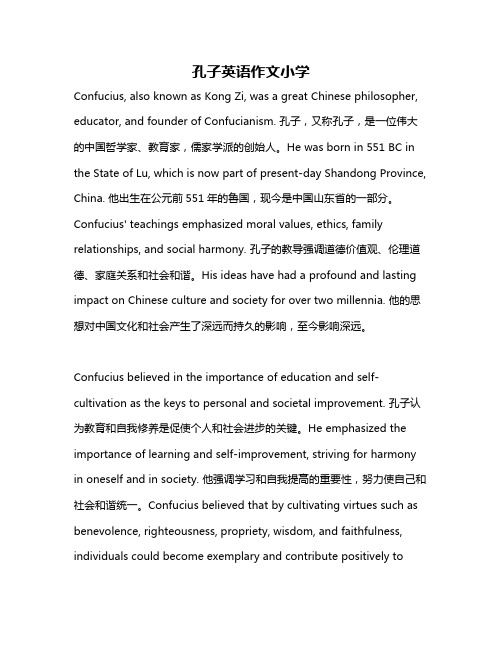
孔子英语作文小学Confucius, also known as Kong Zi, was a great Chinese philosopher, educator, and founder of Confucianism. 孔子,又称孔子,是一位伟大的中国哲学家、教育家,儒家学派的创始人。
He was born in 551 BC in the State of Lu, which is now part of present-day Shandong Province, China. 他出生在公元前551年的鲁国,现今是中国山东省的一部分。
Confucius' teachings emphasized moral values, ethics, family relationships, and social harmony. 孔子的教导强调道德价值观、伦理道德、家庭关系和社会和谐。
His ideas have had a profound and lasting impact on Chinese culture and society for over two millennia. 他的思想对中国文化和社会产生了深远而持久的影响,至今影响深远。
Confucius believed in the importance of education and self-cultivation as the keys to personal and societal improvement. 孔子认为教育和自我修养是促使个人和社会进步的关键。
He emphasized the importance of learning and self-improvement, striving for harmony in oneself and in society. 他强调学习和自我提高的重要性,努力使自己和社会和谐统一。
孔子简介中英版

Confucius was a Chinese thinker and social philosopher of the Spring and Autumn Period.
孔子是我国古代 伟大的思想家和 教育家,儒家学 派创始人。
Confucius is very good at teaching ,there are many students. Confucius thoughts have been Confucius' developed into a system of philosophy known as Confucianism 孔子很擅长教学,有很多的学生。孔子的思想发展成了儒 家。Biblioteka THE END孔府
the Mansion of Confucius
the Temple of Confucius
孔庙
the Cemetery of Confucius
孔林
孔林
Confucius thoughts have great influence on Chinese culture.
孔子的思想对中 国文化有极大的 影响。
Is it a pleasure after all to practice in due time what one has learnt? 学而时习之,不亦说乎?《论语· 学而》 Is it not a delight after all to have friend come from afar? 有朋自远方来,不亦乐乎?《论语· 学而》 Do not impose upon others what you do not desire yourself. 已所不欲,勿施于人。《论语· 卫灵公》
介绍孔子 Confucius
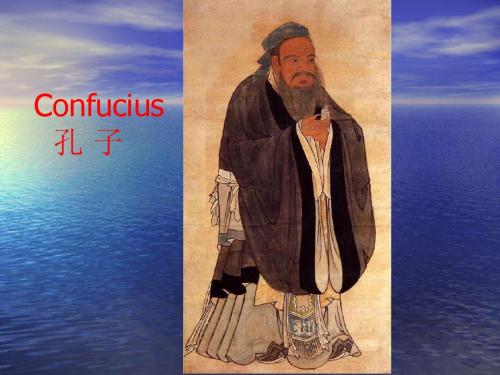
才得以了解他。
• 孔子之所以著名是因为他在古
• Confucius is famous because he
made many wise sayings in ancient China that helped many people learn about nature, the world and human behavior.
代的中国说过许多智慧的话, 帮助人们认识自然、世界和人 的行为规范。
Wise Confucius
他的观点和我们学校要进行的品德教育 “我将要”不谋而合。
His ideas were very similar to the Characte Education ‘I wills’ for the school . They were:
what is just to your advantage.
• “己所不欲,勿施于人。”
want yourself.
• do to others what you would
Confucius 孔子
春秋名字的来历
The reason why the name of the Spring and Autumn Dynasty is because a man wrote a book called "Spring and Autumn."
之所以有春秋的名字, 是因为有个人写了一本 书,名字叫《春秋》。
Confucius 孔子
The ancient Chinese thinker and educator.
中国古代伟大的 思想家和教育家。
Confucቤተ መጻሕፍቲ ባይዱus 孔子
• 孔子(公元前551-公元前479年)是中国古代
孔子的英文简介
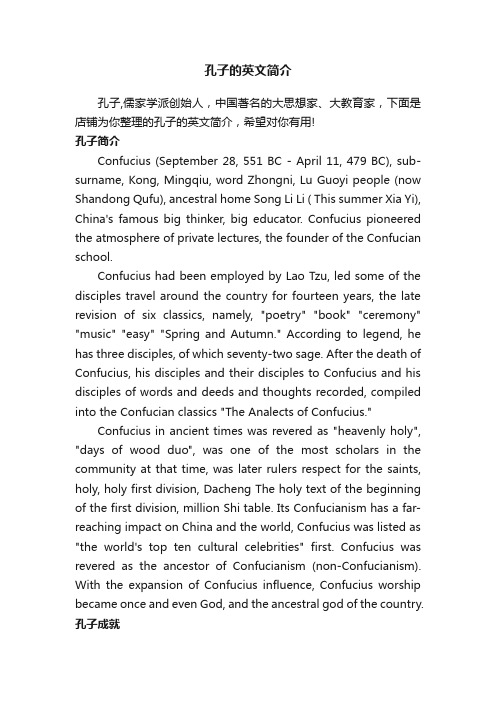
孔子的英文简介孔子,儒家学派创始人,中国著名的大思想家、大教育家,下面是店铺为你整理的孔子的英文简介,希望对你有用!孔子简介Confucius (September 28, 551 BC - April 11, 479 BC), sub-surname, Kong, Mingqiu, word Zhongni, Lu Guoyi people (now Shandong Qufu), ancestral home Song Li Li ( This summer Xia Yi), China's famous big thinker, big educator. Confucius pioneered the atmosphere of private lectures, the founder of the Confucian school.Confucius had been employed by Lao Tzu, led some of the disciples travel around the country for fourteen years, the late revision of six classics, namely, "poetry" "book" "ceremony" "music" "easy" "Spring and Autumn." According to legend, he has three disciples, of which seventy-two sage. After the death of Confucius, his disciples and their disciples to Confucius and his disciples of words and deeds and thoughts recorded, compiled into the Confucian classics "The Analects of Confucius."Confucius in ancient times was revered as "heavenly holy", "days of wood duo", was one of the most scholars in the community at that time, was later rulers respect for the saints, holy, holy first division, Dacheng The holy text of the beginning of the first division, million Shi table. Its Confucianism has a far-reaching impact on China and the world, Confucius was listed as "the world's top ten cultural celebrities" first. Confucius was revered as the ancestor of Confucianism (non-Confucianism). With the expansion of Confucius influence, Confucius worship became once and even God, and the ancestral god of the country. 孔子成就Moral thoughtConfucius built a complete "moral and moral" thought system: at the individual level advocate "benevolence, ritual" virtue and virtue. The moral system of thought is based on the theory of goodness and sorcerer (" Humane and heaven, authentic meet, humane and timely into a methodology of the perfect ideological system.Confucius's Ren said, embodies the humanitarian spirit, Confucius's ritual, it embodies the spirit of ritual, that is, the modern sense of the order and system. Humanism This is the eternal theme of mankind, for any society, any time, any government is applicable, and order and institutional society is the establishment of human civilization, the basic requirements of society. Confucius's spirit of humanism and order is the essence of ancient Chinese social and political thought.Confucius in his later years of the highest ideal called "Datong", in the world of Datong, the world's people, not only their own family for the pro, not only to their parents and children for love, but love each other, love all the people The So that the old end, strong use, the children can get warm and caring, lonely people and people with disabilities have to rely on, men have their own things, women have a satisfactory destination. There is no fraud in the world, no thieves, the road is not picked up, the night is not closed, everyone stresses the letter repair, election Yin Teng can, the road trip also, the world for the public.political ideologyThe core content of Confucius' political thought is "ritual" and "benevolence". On the strategy of governing the country, he advocated "governing morality" and using morality and ritual to govern the country is the most noble way of governing thecountry. This strategy is also called "rule of virtue" or "rule of law". This strategy to Germany, the courtesy of the people, strict hierarchical system, the aristocracy and the common people divided by the rulers and the rulers. Breaking the aristocracy and the common people between the original an important line.Confucius lived in the Western Zhou Dynasty patriarchal tradition of deep Lu, when the ruling power of the Zhou dynasty has been in name only, the princes fighting each other constantly, there has been "Wang Daowei, ritual waste, regime loss, family vulgar" social reality , "Jun is not Jun, Chen Chen, father is not the father, son of child" has become the characteristics of that era. The intensification of social contradictions hinders the development of productive forces, and the human spirit and beliefs have also been unprecedentedly devastated. These together constitute the historical and social conditions of Confucius' political thought. "Ren" and "Li" are the basic spirit of his political thought.Confucius' highest political ideal is to establish the "world for the public" of the Datong society. "Datong" the basic characteristics of society is: Avenue smooth, "the world for the public", which can "choose Yin and can, faith repair Mu", "people are not only pro-pro, not only son of his son, so old end, The use of the young people, young people have long, lonely lonely people who have nothing to do, "conspiracy to cheat, theft can not afford, this is an idealized legend of Yao and Shun era of primitive social scene, but also Confucius The vision of the highest ideal society. "Well-off society" is a lower political goal advocated by Confucius. "The well-off society," the basic characteristics of society is: the road hidden, "the world for home", "the pro-pro, the child of his son, the goods forthemselves", and this rich and poor, A series of rules and regulations, ethics, "to the monarch and grandchildren, to Benedict and his son, to the brothers, to and the couple", "to stand in the field, to Xianxiong know", accordingly also set " , By, "to seek is for, and the soldiers from this." This society is clearly not "Datong" as perfect as the world, but there are normal order, polite, benevolence, faith, justice, so called well-off. This society actually describes the "prosperity" of class society after "private ownership".Confucius' "Datong" society, "well-off" social ideal has far-reaching impact on China's later generations. Later, different periodicals, different stages of the thinkers put forward the different content of the vision of the blueprint and the goal, this idea for the progressive thinkers, reformers also have some inspiration, Hong Xiuquan, Kang Youwei, Tan Sitong and Sun Yat-sen are affected.Economic thoughtConfucius' economic thought is the most important thing of righteousness and lightness, "righteousness" and "enriching the people". This is also the main content of Confucian economic thought, has a greater impact on future generations.Confucius called "righteousness", is a kind of social morality, "Lee" refers to people's pursuit of material interests. In the relationship between "righteousness" and "profit", Confucius puts "righteousness" in the first place. He said: "see the righteousness." Ask people in the material interests of the face of BC, the first should be considered how to meet the "righteousness." He believes that "justice and then take", that is only in line with "justice", and then to get. Confucius even in the "Analects of Confucius Zi" advocated "rare words", that is to say"benefit", but not not "benefit". "Zuozhuan into the public two years" records, do not meet the moral things and get rich, just as clouds, disdain with unreasonable means to obtain wealth. Confucius also believes that the treatment of "righteousness" and "benefit" attitude, can distinguish between "gentleman" and "villain". A moral "gentleman", easy to understand the "righteousness" of the importance of the lack of moral cultivation of the "villain", only know "benefit" and do not know "justice." This is Confucius in the "Analects of Confucius in the" said "gentleman Yu Yi, villain Yu Li." Some people think that since Confucius "righteousness", it is bound to underestimate the manual labor. This view is wrong. "The Analects of Confucius" in the record of his disciples who want to learn agriculture Fan Chi very dissatisfied, called him "villain", it is because Confucius that people have greater ideals and pursuits, to bear the greater responsibility. He wants his students to be the bearers of value rather than a farmer.education doctrineConfucius in the history of China, the first proposed similar to the quality of human talent, personality differences mainly because of the acquired education and social environmental impact ("similarity is also similar"). So that everyone may be educated, everyone should be educated. He advocated "teach no class", founded private school, wide recruit students, breaking the slave owners aristocratic school education monopoly, the scope of education extended to civilians, conform to the trend of social development. He advocated "learning and gifted", learning and spare capacity, went to an official. His education aims to cultivate a gentleman in politics, and a gentleman must have a high moral quality of cultivation, so Confucius stressed that theschool education must be moral education in the first place ("disciples into the filial piety, out of Ti, Panting the public, and the pro-people. Line of spare capacity, then the text ").Confucius in the teaching methods require teachers to "teach no class", "by the state economy" education concept, "individualized", "heuristic" methodology, pay attention to T ong Meng, enlightenment education. He educated students to have honest learning attitude, to be modest and studious, often review the knowledge learned, so that "warm and know the new", new knowledge extended broad, in-depth, "one and the other."The main contents of Confucius' moral education are "ritual" and "benevolence". Which "ceremony" for the moral norms, "benevolence" for the highest moral standards. "Ceremony" is the form of "benevolence", "benevolence" is the content of "ritual", with the spirit of "benevolence", "ritual" really fulfilled. In the moral cultivation, he proposed to establish ambition, self-denial, practice line, introspection, courage to turn over and other methods. "Learning and learning" is the dominant thought of Confucius' teaching thought. While advocating the shamelessly asked, modesty, he emphasizes the combination of learning and thinking ("learning without thinking, thinking and not learning is almost"), but also must "learn to use", the knowledge learned social practice.He first proposed heuristic teaching. He said: "Do not be angry, do not speak without hair." Means that teachers should seriously think in the students, and has reached a certain degree of just right to inspire and enlighten, he is the first practice in teaching practice teaching Family. Through the conversation and individual observation and other methods, he understood and familiar with the personality characteristics of students, on thisbasis, according to the specific circumstances of each student, to take different educational methods, cultivate a virtue, speech, politics, literature and other talents The Confucius loves education and is engaged in educational activities all his life. He learns tirelessly and tirelessly. Not only teaching, more emphasis on teaching, to their own model behavior students. He loves students, students also respect him, teacher-student relationship is very harmonious. He is a typical example of the ancient Chinese teachers.Confucius' educational activities not only cultivate many students, but also put forward the theory of education on the basis of practice, laying a theoretical foundation for ancient Chinese education. Because of the conservative political attitude of Confucius, the reform of the economic system also reflects the conservative thinking. For example, Lu Xuan Gong fifteen years (AD 594 BC) to implement the "early tax mu", from the legal recognition of the legal status of private land, is the Spring and Autumn period of major economic reform; but according to "Zuo Zhuan" Spring and Autumn "when the record" early tax mu ", the purpose is to criticize its" indecent assault ". And the people are not rich, the monarch is not rich. In the "The Analects of Confucius Yao Yue" also recorded, Confucius advocated "for the benefit of the people and benefit", that is beneficial to the people to do things. On the other hand, he also advocated tax to be lighter, corvee apportionment do not delay agriculture. "The Analects of Confucius," the record, Confucius also on the time for the people to preach, ask the government do not be too extravagant, pay attention to thrift. He said: "extravagant is not bad, thrifty is solid. With its not inferior, Ninggu." At the same time, also advocated "section with love." This includes the use ofConfucius' "benevolence" in the economic field.AestheticsThe core of Confucius' aesthetic thought is the unity of "beauty" and "goodness", and also the unity of form and content. Confucius advocated "poetry teaching", that is, the combination of literature and art and political morality, the literature and art as a means of changing social and political means, cultivate an important way of sentiment. And Confucius believes that a perfect person, should be in poetry, ritual, music self-cultivation. Confucius' aesthetic thought has a great influence on the later literary theory.Confucius in the easy to learn clearly put forward the "beauty in which", "a matter of opinion" and other famous aesthetic proposition. Published by the People's Publishing House, "the boy asked easy" on the basis of Yi Zong proposed the United States - masculine, feminine beauty; the beauty of life; the beauty of freedom; That "the beauty of yin and yang, the beauty of life, the beauty of freedom, and beauty can be described as aesthetics of the case."Historical thoughtAn important proposition of Confucius' history is "straight", that is, the study of history to seek truth from facts, not only to attach importance to the basis, but also to "know it, I do not know I do not know" ("politics"), he tried to oppose those arrogant not straight "He is not straightforward, but he does not want to do so, and he does not believe, and I do not know it." ("Taber").Confucius' view of history is not only reflected in the attitude of history and history, but also in the historical development view. Confucius believes that history is constantly "gains and losses", he said: "Yin Yin Xia Li, the profit and loss can be seen also; Zhoubecause of Yin Li, the profit and loss can be seen" ("government"), Zhou is in the summer, On behalf of the foundation to reach an unprecedented civilization. History is not a retrogression, but come from behind, is the development of the forward. Although this idea is very hazy, but it is the history of Chinese history, the evolution of the valuable beginning.Tourism conceptConfucius is rich in life. He realized the incisive philosophy of life from the long travel career and formed a unique view of tourism. Confucius' "tour" has three main forms: tour, study, tour. In other words, Confucius in the tour to ask the teaching, travel in the official Shi Shi, travel in the affectionate, travel in the enlightenment. His travel behavior and study, into the official is inseparable. Confucius' travel ideas can be broadly summarized as follows:Confucius' s View of Distance and NearConfucius said: "gentleman Huaide, villain nostalgia", "people and the nostalgia, not enough for the men." Means a gentleman do not nostalgia for their homeland, should learn through the four parties to learn and realize the lofty ideals and aspirations. It can be seen that Confucius "re-travel", against "Huohuo", "nostalgia" and other psychological and behavior, even to live in love, nostalgia for the gentleman and villain distinction. But Confucius also said: "parents in, not far tour, travel must have", clearly expressed his idea of promoting near travel. "Parents in, not far tour" is also Confucianism to promote the implementation of filial piety, serve their parents, pay attention to the embodiment of human thought.So Confucius both "re-travel", but also against "far travel" to promote "near tour", would it be self-contradictory? Confucius'near-sight and distant view is not contradictory, but the unity of opposites, similar to the relationship between "fish and bear's paw". Travel and near travel, in fact, reflects the Confucian "loyalty" and "filial piety", serve the country and serve the parents of the unity of opposites. Although Confucius advocated "near travel", but also do not blindly exclusion of travel, although advocating the implementation of filial piety, but more advocated "rule the country world." In the end suitable for travel or near travel, choose the standard is whether there is "good". In fact, follow the Confucius travel around the country 14 years of disciples there are many parents who are alive. Confucius opposed only to the legitimate purpose but beyond the reasonable degree of "travel".Confucius focus on cultural tours, natural tour, advocate "landscape than Germany"Confucius life trip to the world, pay attention to listening and enjoyment ceremony, creating a precedent for Chinese cultural tourism. According to historical records: "Confucius was the West into the room, asked the ceremony in the old Dan, Xue Yu Changhong, view of the emperor of the rule." Zuiwangyi not wine, Confucius thought is to learn from the old Dan music. In addition, Confucius visit, and Qi Taishi exchange on the "music" of the views and to achieve the realm of ecstasy. "The Analects of Confucius and": "Son in the Qi Wen" Shao ", learn, March I do not know meat, said: 'not figure for the music of the Sri Lanka also.'" Confucius travel in the four parties to learn, appreciate the ancient ceremony Music civilization, which in fact is now talking about cultural tourism.In addition to promoting the cultural journey to listen to music, Confucius also focus on the natural landscape of the tour.For the landscape of the natural landscape, Confucius pay more attention to the "beauty" of the feelings, such as familiar for us: "Know who Lok water, benevolent Leshan; know who move, benevolent static; knowledge of music, benevolent life." In Confucius, The clever and flowing water has a metaphysical commonality; the generosity of the benevolent is interlinked with the solemn and steady mountains. This is the "landscape than Germany," the aesthetic, experience. "Bi" refers to the symbol or comparison, "moral" refers to the moral or spiritual quality, means that in the enjoyment of landscape natural landscape, according to its characteristics analogy of people's moral character, that is, the natural landscape of humanization.Confucius advocates tourism to be healthy, against lionConfucius said: "Benefit three music, loss of three music. Festival rituals, music people of goodness, music more virtuous friends, benefits carry on. Le proud music, music lost travel, music Yan Le, loss carry on." Said to be proud of to play, to play around, idle for fun, the size of the feast for the music, are harmful to the happy. Visible, Confucius against idle, swinging pleasure, unrestrained play and other lost travel behavior. He believes that lost travel beyond the individual physical and mental capacity and social ritual license, lost travel is a temporary, limited, and will bring their own great damage.Concept of life◎ angry forgotten, happy to forgetConfucius 62 years old, had described himself as: "It is also people, angry, happy to forget, I do not know the old will be to the cloud Seoul." At that time, Confucius has led his disciples around the country 9 years, gone through hardships, not only did not get Princes of the appointment, but also almost killed, butConfucius is not easy to retreat, is still optimistic about uphold their own ideals, and even know that it can not do it.◎ poor musi c RoadIn the eyes of Confucius, justice is the highest value of life, in the rich and the poor and moral contradictions, he would rather be poor will not give up morality. But his poor music and music can not be seen as not seeking wealth, just to maintain the Road, this is not consistent with historical facts. Confucius also said: "rich and expensive, people do not have their own, not the way, not the same. Poor and cheap, people of evil also; not its Road, not to also." " But also for the rich, but also for the whip of the people, I also, if not, from my good.◎ learning and tireless, tireless tirelesslyConfucius is known for his knowledge, and he has a strong interest in all kinds of knowledge. Therefore, he is versatile and knowledgeable. He was famous at the time and was almost regarded as an omniscient saint. But Confucius did not think that Confucius said: "Confucius schoolless division, who has knowledge, who there is something he did not know, he worship who is a teacher, so that" three lines, will be Have my teacher, choose the good and from it, its poor and changed.◎ straight and lineConfucius nature of integrity, but also advocate straight and line, he said: "I also in the people who, who destroyed who reputation, such as the reputation of those who have the test." Sri Lanka people also, the reason why the three generations of the line also. "" Historical Records "contained more than thirty-year-old Confucius in his eloquence in the Lao Tzu, parting when I gave the words:" clever and close to the dead, good people who also. Bo debate the majority of the body, This is the reminder ofConfucius in good faith, but also pointed out that some of the problems of Confucius, is to see the problem is too deep, the speech is too sharp, hurt some of the status of the people, Of people, will bring their own great danger.◎ good with peopleConfucius founded the moral theory of benevolence, and he himself was a very kind person, compassionate, helpful and sincere and generous. "Do not want to do, do not impose on people", "gentleman adult beauty, no adult evil", "bow and thick and thin people" and so on, are his life criteria. Confucius said: "I have five and learn to learn, thirty standing, forty and no doubt, fifty and know destiny, sixty and earning, seventy and from the heart, not overdue." This is the life of their own Stage of the summary.。
中国的孔子,世界的孔子Confucius_in_China_and_Confucius_in_the

中国的孔子,世界的孔子文/王天宇在联合国教科文组织确认的世界十大文化名人之中,孔子与柏拉图、亚里士多德、哥白尼、牛顿、达尔文、培根、阿奎那、伏尔泰、康德共同当选,其中孔子为世界十大文化名人之首。
孔子,名丘,字仲尼,出生于公元前551年,鲁国陬邑(今山东曲阜)人。
孔子开创了私人讲学的风气,是儒家学派创始人。
孔子在古代被尊奉为“天纵之圣”,是当时社会上的最博学者之一,其儒家思想对中国和世界都有深远的影响。
半部论语治天下孔子曾受业于老子,带领部分弟子周游列国十四年,相传他有弟子三千,其中七十二贤人。
孔子去世后,其弟子及其再传弟子把孔子及其弟子的言行语录和思想记录下来,整理编成儒家经典《论语》。
子曰:己所不欲,勿施于人;在邦无怨,在家无怨,这句话出自《论语·颜渊》。
大意是如果自己都不希望被人此般对待,推己及人,自己也不要那般待人。
谈及孔子,不得不提《论语》。
《论语》汉代成书,主要记录孔子及其弟子的言行,较为集中地反映了孔子的思想,是儒家学派的经典著作之一。
以语录体为主,叙事体为辅,集中体现了孔子的政治主张、伦理思想、道德观念及教育原则等。
与《大学》《中庸》《孟子》并称“四书”,与《诗》《书》《礼》《易》《春秋》等“五经”,总称“四书五经”。
全书共20篇、492章,首创“语录体”,是中国现代传扬并学习的古代著作之一。
北宋政治家赵普曾有“半部《论语》治天下”之说。
它从一个侧面反映出此书在中国古代社会所发挥的作用与影响之大。
和任何的其他中国传统文化一样,作为一部经典著作,《论语》有很明显的时○孔子燕居像(明代)A portrait of Confucius painted during the Ming DynastyCONFUCIUS IN CHINA AND CONFUCIUS IN THE WORLD○孔子墓前修学结业的外国人。
图/张仁玉Foreigners receiving their course completion certificates in front of Confucius’ tomb代特征,有很强烈的远古韵味,里面有很多激动人心的东西,当然也有一些和当今时代相背离的东西。
confucius孔子的英文意思
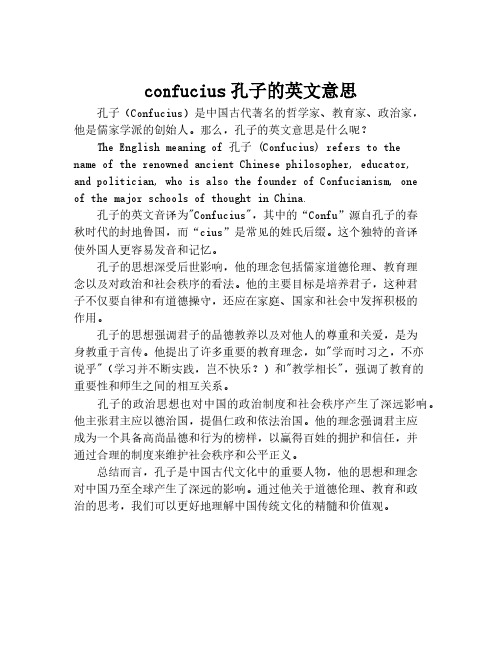
confucius孔子的英文意思孔子(Confucius)是中国古代著名的哲学家、教育家、政治家,他是儒家学派的创始人。
那么,孔子的英文意思是什么呢?The English meaning of 孔子 (Confucius) refers to the name of the renowned ancient Chinese philosopher, educator, and politician, who is also the founder of Confucianism, oneof the major schools of thought in China.孔子的英文音译为"Confucius",其中的“Confu”源自孔子的春秋时代的封地鲁国,而“cius”是常见的姓氏后缀。
这个独特的音译使外国人更容易发音和记忆。
孔子的思想深受后世影响,他的理念包括儒家道德伦理、教育理念以及对政治和社会秩序的看法。
他的主要目标是培养君子,这种君子不仅要自律和有道德操守,还应在家庭、国家和社会中发挥积极的作用。
孔子的思想强调君子的品德教养以及对他人的尊重和关爱,是为身教重于言传。
他提出了许多重要的教育理念,如"学而时习之,不亦说乎"(学习并不断实践,岂不快乐?)和"教学相长",强调了教育的重要性和师生之间的相互关系。
孔子的政治思想也对中国的政治制度和社会秩序产生了深远影响。
他主张君主应以德治国,提倡仁政和依法治国。
他的理念强调君主应成为一个具备高尚品德和行为的榜样,以赢得百姓的拥护和信任,并通过合理的制度来维护社会秩序和公平正义。
总结而言,孔子是中国古代文化中的重要人物,他的思想和理念对中国乃至全球产生了深远的影响。
通过他关于道德伦理、教育和政治的思考,我们可以更好地理解中国传统文化的精髓和价值观。
confucius意思

confucius意思
Confucius是孔子的英文译名,孔子是中国古代的伟大思想家、教育家和政治家。他的思 想被称为儒家思想,对中国乃至整个东亚地区的文化和社会产生了深远影响。以下是一些关 于Confucius的双语例句:
1. Cortance of moral values and ethical behavior in society.(孔子强调道德价值观和伦理行为在社会中的重要性。)
2. Confucius believed in the importance of education for personal and societal development.(孔子相信教育对个人和社会发展的重要性。)
confucius意思
3. Confucius's teachings emphasized the cultivation of virtues such as benevolence, righteousness, and filial piety.(孔子的教导强调修养仁、义、孝等美德。)
4. Confucius's philosophy emphasized the importance of harmonious relationships within the family, society, and the state.(孔子的哲学强调家庭、社会和国家内部的和谐关 系的重要性。)
孔子的作品英语介绍作文

孔子的作品英语介绍作文孔子(Confucius)是中国古代最伟大的思想家和哲学家之一,他的思想对中国乃至世界的文化产生了深远的影响。
他的作品,尤其是《论语》(Analects)是中国古代经典之一,被誉为东方文化的瑰宝。
以下是对孔子及其作品的英文介绍。
Confucius, also known as Kong Zi or Kong Fuzi, was a Chinese philosopher, teacher, and political theorist. He lived during the Spring and Autumn Period of Chinese history, which lasted from approximately 771 to 476 BCE. Confucius's teachings, which focused on ethics, morality, and social relationships, have profoundly influenced Chinese culture for over two millennia.One of Confucius's most famous works is the "Analects,"a collection of his teachings and conversations with his disciples. Written after his death by his followers, the Analects provides valuable insights into Confucius's philosophical thoughts and principles. It covers a wide range of topics, including governance, education, ethics,and personal conduct.The Analects emphasizes the importance of moral cultivation and self-improvement as the foundation for creating a harmonious society. Confucius believed in the concept of "ren," often translated as "benevolence" or "humanity," which he considered the highest moral virtue.He advocated for individuals to cultivate virtues such as filial piety, loyalty, honesty, and humility in their daily lives.Central to Confucian thought is the idea of the "junzi," or "gentleman" or "noble person." The junzi is someone who embodies moral integrity, wisdom, and social responsibility. Confucius believed that society could achieve stability and prosperity if its leaders andcitizens aspired to become junzi and followed theprinciples of benevolence, righteousness, propriety, wisdom, and sincerity.Confucius's teachings also emphasize the importance of education in moral development and self-cultivation. Hebelieved that education should focus not only on acquiring knowledge but also on cultivating moral character andethical behavior. Confucian education aims to instill in individuals a sense of duty, responsibility, and reverence for tradition and authority.In addition to the Analects, Confucius's other notable works include the "Book of Rites" (Li Ji), the "Book of Documents" (Shang Shu), and the "Spring and Autumn Annals" (Chunqiu). Together, these texts form the foundation of Confucianism, a philosophical and ethical system that has shaped Chinese civilization for centuries.Confucianism has had a lasting impact not only in China but also in other East Asian countries such as Japan, Korea, and Vietnam. Confucian values continue to influence various aspects of society, including politics, education, ethics, and interpersonal relationships.In conclusion, Confucius's works, particularly the Analects, are essential texts for understanding his philosophical teachings and their enduring significance inChinese culture and beyond. His emphasis on moral cultivation, social harmony, and ethical leadership continues to resonate with people around the world, making him one of the most influential figures in human history.。
confucius词根
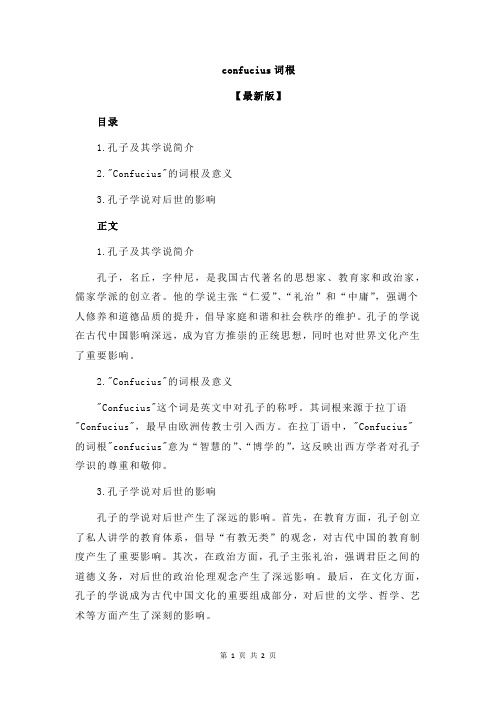
confucius词根
【最新版】
目录
1.孔子及其学说简介
2."Confucius"的词根及意义
3.孔子学说对后世的影响
正文
1.孔子及其学说简介
孔子,名丘,字仲尼,是我国古代著名的思想家、教育家和政治家,儒家学派的创立者。
他的学说主张“仁爱”、“礼治”和“中庸”,强调个人修养和道德品质的提升,倡导家庭和谐和社会秩序的维护。
孔子的学说在古代中国影响深远,成为官方推崇的正统思想,同时也对世界文化产生了重要影响。
2."Confucius"的词根及意义
"Confucius"这个词是英文中对孔子的称呼。
其词根来源于拉丁语"Confucius",最早由欧洲传教士引入西方。
在拉丁语中,"Confucius"
的词根"confucius"意为“智慧的”、“博学的”,这反映出西方学者对孔子学识的尊重和敬仰。
3.孔子学说对后世的影响
孔子的学说对后世产生了深远的影响。
首先,在教育方面,孔子创立了私人讲学的教育体系,倡导“有教无类”的观念,对古代中国的教育制度产生了重要影响。
其次,在政治方面,孔子主张礼治,强调君臣之间的道德义务,对后世的政治伦理观念产生了深远影响。
最后,在文化方面,孔子的学说成为古代中国文化的重要组成部分,对后世的文学、哲学、艺术等方面产生了深刻的影响。
confucius 阅读理解
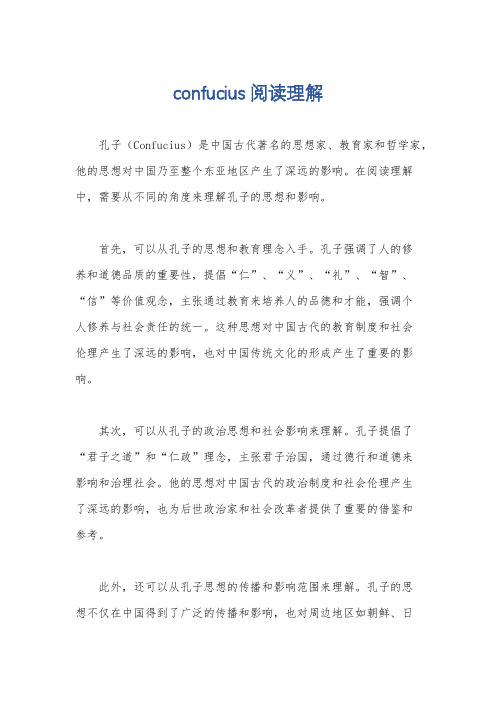
confucius 阅读理解
孔子(Confucius)是中国古代著名的思想家、教育家和哲学家,他的思想对中国乃至整个东亚地区产生了深远的影响。
在阅读理解中,需要从不同的角度来理解孔子的思想和影响。
首先,可以从孔子的思想和教育理念入手。
孔子强调了人的修
养和道德品质的重要性,提倡“仁”、“义”、“礼”、“智”、“信”等价值观念,主张通过教育来培养人的品德和才能,强调个
人修养与社会责任的统一。
这种思想对中国古代的教育制度和社会
伦理产生了深远的影响,也对中国传统文化的形成产生了重要的影响。
其次,可以从孔子的政治思想和社会影响来理解。
孔子提倡了“君子之道”和“仁政”理念,主张君子治国,通过德行和道德来
影响和治理社会。
他的思想对中国古代的政治制度和社会伦理产生
了深远的影响,也为后世政治家和社会改革者提供了重要的借鉴和
参考。
此外,还可以从孔子思想的传播和影响范围来理解。
孔子的思
想不仅在中国得到了广泛的传播和影响,也对周边地区如朝鲜、日
本、越南等产生了深远的影响,成为东亚地区的重要文化传统之一。
同时,孔子的思想也在近现代得到了重新的关注和研究,成为世界
文化交流和对话的重要内容之一。
综上所述,孔子的思想和影响是一个多方面的话题,需要从不
同的角度来理解和分析。
通过对孔子思想的深入阅读和思考,可以
更好地理解中国传统文化和东亚地区的思想传统。
- 1、下载文档前请自行甄别文档内容的完整性,平台不提供额外的编辑、内容补充、找答案等附加服务。
- 2、"仅部分预览"的文档,不可在线预览部分如存在完整性等问题,可反馈申请退款(可完整预览的文档不适用该条件!)。
- 3、如文档侵犯您的权益,请联系客服反馈,我们会尽快为您处理(人工客服工作时间:9:00-18:30)。
.Today, I will represent our group to introduce a famous person: Confucius, here. (停顿)And I will talk about him from three aspects.As follows:First of all, who is Confucius?Second, what are Confucius’s ideas and views?Third, how and why could Confucian thought in 21st century still retains the interest of people all over the world?一、简介(Introduction)Confucius, known in China as Kongzi, given name Qiuand alias ['eɪlɪəs] Zhongni, was a native of Zouyi of the State of Lu during the Spring and Autumn Period.He put two thoughts forward as “Ren” and “li”.For the reason that Confucius lived in times of many wars, his thoughts about ren cannot be useful. So he devote much time on education. What’s more, he took his disciples [dɪ'saɪp(ə)l] around other countries.As a great thinker, educator and founder of Confucianism, Confucius is an ancient sage(圣人) to the Chinese People. His words and life story were recorded by his disciples and theirstudents in The Analects ['ænəlekts].二、思想主张(Ideas and views)Ren and li are the two core concepts of Confucius’ doctrine about people.First: Li (主张“礼”):Confucius placed emphasis on li with the aim of preserving social order, stability and harmony. Therefore, the Analects says, “The role of li is to maintain harmony among people.” (礼之用,和为贵)Confucius ceremony, is not only the king's gift, the gift of father and son, but the gentleman unmoved attitude in the face of all. (礼的应用,以遇事做得恰当和顺为可)Second: Ren (主张“仁”):Confucius’s most important interpretation of Ren is“Love people”. This love is not only the universal love, furthermore, it should begin with the love for one’s parents. So he said: ”The greatest love for people is the love for one’s parents ”.(仁者,人也,亲亲为大)仁爱就是人的属性,将爱父母亲放在第一位。
"Ren"is a kind of the personality charm which is enough to convince people first of all. What’s more, "Ren" is a way of life cultivation. Last but not least, "Ren" is part of Confucius helping the people. (“仁”首先是一种足以使人诚服的人格魅力。
“仁”是一种人生修为之方法。
“仁”是孔子匡时济世之良方。
)Third: Education (主张“因材施教”): Teaching according to some of the acts (因材施教) are the summarize for Confucius of generalizations.It,is based on the specific circumstances of different objects,with different educational methods.To do this,we must first know the st udents strengths,weaknesses and their respective characteristics. For example, our team, I am a speaker, Zhuang is the producer of slides, and other members search the information together.三、当今社会对世界的影响(Influence towards people all overthe world)中方:(Influence in China)In the development of thousands of years in China, Confucianism [kən'fjʊʃə,nɪzm] became the Chinese traditional culture representative. It has influenced the world for about 2,000 years.I think that there are three thoughts making sense as follows. The first thought is about the relationship of Heaven and human beings.(关于天堂和人类的关系)Confucius was the first person who regarded “heaven” as nature and this was an innovative idea in his time. He required people to hold Heaven in awe. In the 21st century, the opinion “standing in awe of the ordinances['ɔːdɪnəns] of Heaven”(保持敬畏的天堂)still holds true, so we should indeedlisten to the voice of nature as we develop our economy and build a harmonious world.(倾听大自然的声音,发展我们的经济,构建和谐的世界)The second thought is about Humanity, which includes two core concepts: Ren and Li. (仁和礼的影响) T oday the Confucian doctrine of “Do not do toward others anything you would not want to be done to you” (己所不欲,勿施于人)still holds true for humankind. He placed emphasis on Li with the aim of preserving social order, stability and harmony. (他强调,礼的目的在于维护社会秩序,稳定和和谐)In the 21st century, people also emphasize the importance of the love and the social manners or rules.(爱和社会礼仪的重要性或者规则)So many of the Confucian can give us a guide how to love others and behave ourselves. (这么多的儒家可以给我们一个指导如何去爱他人,为人处事之道)The third thought is about the education.(教育)He also believed the basic goal of education was to cultivate “persons of virtue”. (基本的思想是培养有道德的人)In the 21st century, we also need the comprehensive [kɒmprɪ'hensɪv] talents(综合型人才)to make contribution to our world. With the idea of equality, most of kids today can be educated equally. (平等的观念,孩子才可以受到同等的教育)西方:(Influence in occident < n.西方国家;欧洲国家>)The exact time of the Confucianism was introduced into the west, have been identified for 1593 years. French philosopher Voltaire [vɔl'ter], Germany Leibnitz ['laibnits] had been systematically [,sɪstə'mætɪklɪ] studied "the book of changes"《易经》and the thoughts of Confucius, and is under the influence of Confucianism. It is based on the study of yi jing, Leibniz put forward his binary system二进位制, the influence on western world is very big. 儒家思想传入西方,被确认的准确时间为1593年。
